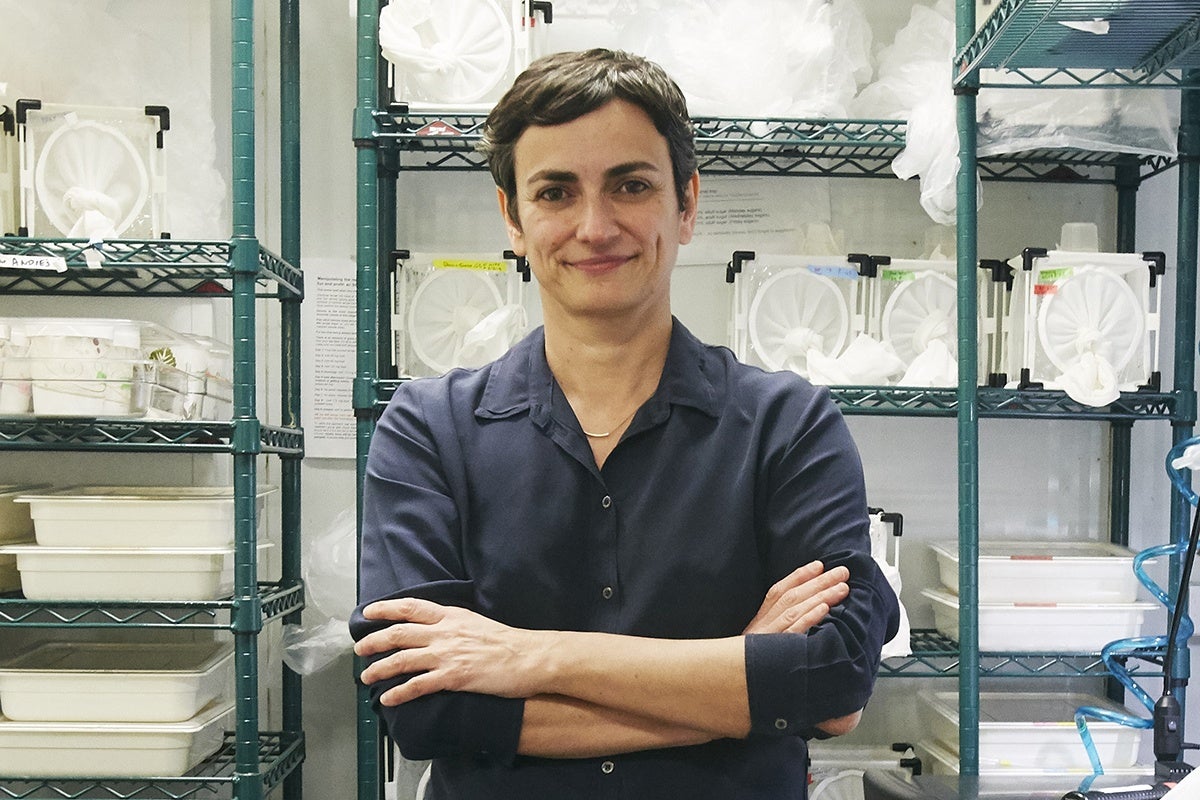Bacteria induce metabolic perturbations in ticks.
Shaw WR, Catteruccia F.
Nat Microbiol. 2024 Sep. 9(9):2206-2207. PMID: 39169125
Irene Heinz Given Professor of Immunology and Infectious Diseases
Immunology and Infectious Diseases
Director of the PhD Program in Biological Sciences in Public Health
Immunology and Infectious Diseases
Harvard T.H. Chan School of Public Health
Research
Malaria, a leading cause of death in tropical and subtropical regions, is transmitted by the bite of female Anopheles mosquitoes. In Africa, where 90% of deaths occur, the major malaria vector is the mosquito Anopheles gambiae. Females of this and related species have a high reproductive capacity that is ensured by a single mating event followed by multiple blood feeding cycles.
In our research group we study the molecular and behavioral parameters that are key to the ability of Anopheles mosquitoes to transmit malaria, with special emphasis on reproductive biology and vector-Plasmodium interactions. Our aim is to provide crucial knowledge to aid the development of new, effective tools for mosquito and malaria control. A key component of our research includes fieldwork studies in Africa on mating biology and natural malaria infections. These studies, in collaboration with Kamuzu University Malawi, ICIPE in Kenya and other partners, are expanding our understanding of mosquito reproductive biology, mosquito-microbiota interactions, and natural malaria infections
Currently our scientific program covers a number of research areas:
Reproductive biology; genetic and evolutionary approaches to study reproductive traits important for vectorial capacity. Over the past few years we have been exploring previously unknown hormonal signalling pathways that are relevant for the reproductive success of the mosquito vector. We have demonstrated that the steroid hormone 20-hydroxyecdysone (20E), produced by the male and transferred to the female during mating as part of a coagulated mating plug, has dramatic effects on female physiology and behaviour. Sexual transfer of this hormone, an acquired trait in anopheline mosquitoes based on our evolutionary analyses, increases egg development after blood feeding, induces egg laying, helps fertility and triggers a long-lasting refractoriness to further copulation. We are currently characterizing the hormonal signaling pathways triggered by mating and boosted by blood feeding to study how the interplay between these two key reproductive processes determines female reproductive success in a number of mosquito species.
Mosquito pathways that facilitate Plasmodium development. While a wealth of studies have focused on the immune responses of mosquitoes to Plasmodium infections, little is known about how these parasites exploit the physiological environment of the blood-fed mosquito to develop and become transmissible, or how these unknown vector-parasite interactions may differ depending on the specific Anopheles-Plasmodium combination. We are studying the physiological factors that are exploited by Plasmodium parasites (P. falciparum and P. vivax) for their own development using a variety of mosquito species in combination with both laboratory and field isolates of human malaria parasites. Moreover, we aim to analyze the effects of novel control tools on the vectorial competence of Anopheles mosquitoes, and to determine selective pressures that may be imposed by these tools on Plasmodium parasites.
From the bench to the field: generation of tools to reduce the malaria burden. Our lab is strongly committed to developing translational tools to suppress field mosquito populations and prevent malaria transmission. Widespread insecticide resistance among Anopheles mosquito populations represents one of the most significant threats to existing malaria control programs. We aim to translate our laboratory findings into novel products that can aid current insecticide-based programs or provide effective alternatives to insecticide use. Our projects include the generation of gene drive systems to spread anti-Plasmodium genes through mosquito populations, the identification and validation of natural mosquito endosymbionts that prevent Plasmodium development, such as Wolbachia, and the generation of sterilizing and life-shortening compounds that can be incorporated into insecticide-based control programs.
Ph.D., 1999, Molecular Entomology
Imperial College London, London
‘Most Powerful Women’ Award
Fortune Italy
Investigator
Howard Hughes Medical Institute
Associate Professorship
Melvin J. and Geraldine L. Glimcher
Career Incubation Fund Award
Harvard Chan School of Public Health
Faculty Scholar Award
Howard Hughes Medical Institute/Bill and Melinda Gates Foundation
William F. Milton Fund Award
Harvard Chan School of Public Health
Value in People Award
Wellcome Trust
Shaw WR, Catteruccia F.
Nat Microbiol. 2024 Sep. 9(9):2206-2207. PMID: 39169125
Smidler AL, Marrogi E, Kauffman J, Paton DG, Westervelt KA, Church GM, Esvelt KM, Shaw WR, Catteruccia F.
Sci Rep. 2024 02 19. 14(1):4057. PMID: 38374393
Stryapunina I, Itoe MA, Trinh Q, Vidoudez C, Du E, Mendoza L, Hulai O, Kauffman J, Carew J, Shaw WR, Catteruccia F.
PLoS Genet. 2024 Jan. 20(1):e1011145. PMID: 38285728
Werling K, Itoe MA, Shaw WR, Hien RD, Bazié BJ, Aminata F, Adams KL, Ouattara BS, Sanou M, Peng D, Dabiré RK, Da DF, Yerbanga RS, Diabaté A, Lefèvre T, Catteruccia F.
PLoS Negl Trop Dis. 2024 Jan. 18(1):e0011890. PMID: 38206958
Adams KL, Selland EK, Willett BC, Carew JW, Vidoudez C, Singh N, Catteruccia F.
PLoS Pathog. 2023 Jun. 19(6):e1011448. PMID: 37339122
Smidler AL, Paton DG, Church GM, Esvelt KM, Shaw WR, Catteruccia F.
bioRxiv. 2023 Jun 13. PMID: 37398131
Stryapunina I, Itoe M, Trinh Q, Vidoudez C, Du E, Mendoza L, Hulai O, Kauffman J, Carew J, Shaw WR, Catteruccia F.
bioRxiv. 2023 Jun 03. PMID: 37398018
Baden L, Catteruccia F, Diabaté A, Donini C, Nosten F, O'Neill S, Osier F, Phyo AP, White N.
N Engl J Med. 2023 02 02. 388(5):e9. PMID: 36724327
Kamiya T, Paton DG, Catteruccia F, Reece SE.
Trends Parasitol. 2022 12. 38(12):1031-1040. PMID: 36209032
Peng D, Kakani EG, Mameli E, Vidoudez C, Mitchell SN, Merrihew GE, MacCoss MJ, Adams K, Rinvee TA, Shaw WR, Catteruccia F.
Nature. 2022 08. 608(7921):93-97. PMID: 35794471
Infectious disease researcher Flaminia Catteruccia, who explores novel eradication methods in her lab and in the field, remains optimistic about defeating the notoriously complex disease.

Flaminia Catteruccia, professor of immunology and infectious diseases at Harvard Chan School, has been elected as a member of the National Academy of Sciences.

The Howard Hughes Medical Institute (HHMI) has named Flaminia Catteruccia, professor of immunology and infectious diseases at Harvard Chan School, as one of 33 new HHMI investigators.

An additional feeding on human blood by a mosquito infected with Plasmodium falciparum, the parasite that causes malaria, can accelerate the development of the parasite and increase the potential for transmission to humans, according to new research led…
Hyegi Chung, MPH ’18, and former Harvard Chan postdoc Evdoxia Kakani met with students to talk about their work at Verily—a subsidiary of Alphabet, the parent company of Google—on using a tech-centric approach to reduce mosquito-borne diseases.
